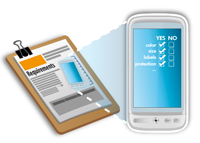 A client asked me this question recently:
A client asked me this question recently:
Is there any way I can get some assurance of the validity of the company as well as the quality of the final product before sending full payment? They have asked for a 30% deposit by T/T.
I get many similar questions from relatively inexperienced importers, so I thought it might be a good idea to share my response with my readers. Here is what I can advise, in a few paragraphs.
First, before you send an advance payment of 30%, you need to make sure they told you the truth about the factory (its size, what products it makes…), and how well organized they are. We can do this. I can confirm the price and advise the most appropriate type of audit once I know the factory address, the factory’s size, the type of product you intend to purchase, and the distribution channels you are going to use.
Second, make sure to negotiate the following terms: 30% advance payment before production (it will be hard to negotiate for less), and 70% after (not before) the goods are shipped to you (they will fax the bill of lading to you and you will wire the money). If they refuse that, make sure the 70% balance is paid after a quality inspection is passed. I also strongly advise to include the possibility of performing quality inspections on the purchase order form you will use (and a good template can be found here).
Third, send an inspector to the factory to check the quality of the products. If you let the supplier ship defective products, you won’t be able to return them for rework. At the very least, make sure a final inspection (before shipment) is done, since it is the only time the average quality, the packing, and the total quantity can be confirmed. In most cases, the cost is about 300 USD. If your budget allows for it, it is also good to inspect the products during production, as it allows to catch problems before it is too late.
Am I forgetting anything important?

Great summary of why things tend to go wrong. Many things are taken for granted by both buyers and suppliers. What’s more frustrating is when clients refuse to let us manage the supplier selection and go at it on their own.
Right now we have such a case. The client insisted on a disorganized (and 5% “cheaper” than the rest) supplier they found on their own, despite us providing a list of serious and compliant manufacturers… all I can say that production finished after serious delays but with major quality issues… and of course the regular “this is not how it SHOULD be” wining circus get’s started..
SURE, many things are not the way they SHOULD be… people need to be a bit more pragmatic. Especially when doing business here in China.
Thanks Fredrik. Yes that’s a classic. Sometimes people need a good lesson before they understand that the cheapest FOB price is not always the cheapest total price.
It gets much worse if the order is large. With a small order, it’s easy to say “it was a learning experience” 😉
“Being wise as a serpent” is a good theme when importing and dealing with offshore suppliers. From what I’ve seen, and it’s a weird phenomenon, is that many buyers become even more naive and relaxed when dealing offshore than if doing business on their own home front.
My personal take is because they feel so overwhelmed that they don’t realize there are basic and foundational safe-points they can implement that would save them a world of hurt.
This post did a good job of showing a buyer how to consider the necessary protective steps that are critical at the start of the order.
Thanks Jacob. This type of basic advice has been available in many places online for many years, and yet the majority of new importers ignore it.
Maybe banks should be required to have their customers buying in China for the first time agree to certain statements, the same way they do when they invest in a risky hedge fund 😉